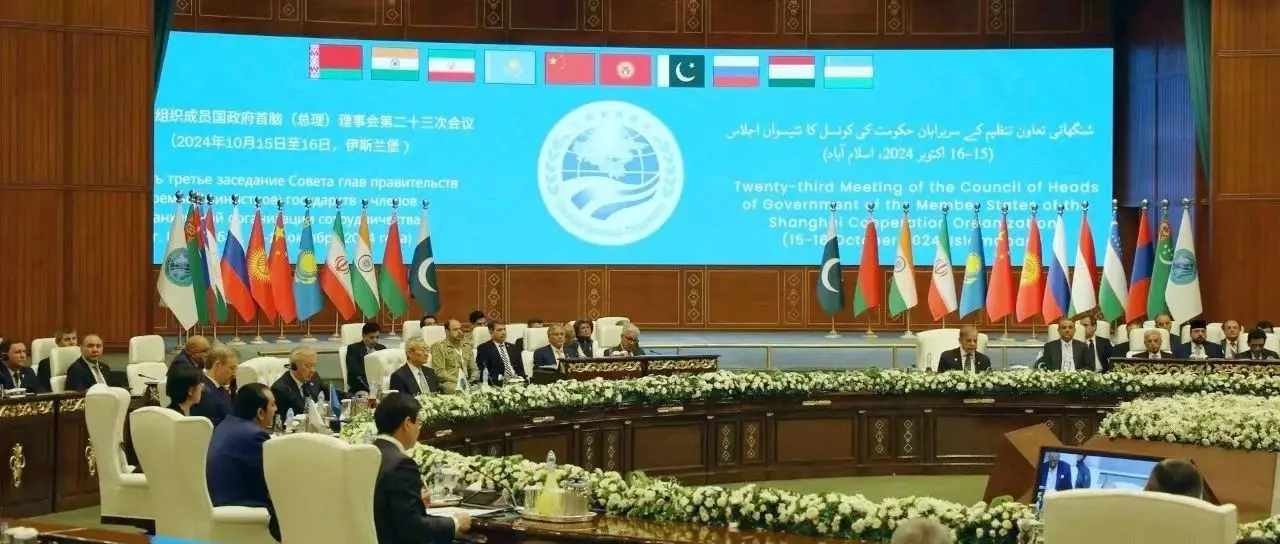A meeting, some are happy, some are anxious, some are envious.

昨天,上海合作组织成员国政府首脑(总理)理事会第次会议在巴基斯坦首都伊斯兰堡圆满闭幕。国务院总理李强出席会议并访问巴基斯坦。这是今年月中国接任上合组织轮值主席国后,召开的首次全体成员大会,有力回应了习近平总书记在阿斯塔纳峰会上提出的五个“共同家园”倡议。
On the date, Premier Li Qiang of the State Council arrived at Nur Khan Airport in Islamabad by chartered plane, warmly welcomed by the Prime Minister of Pakistan. SCO member states are very happy. The "Shanghai Spirit" remains steadfast through the years. Over the past years, from the banks of the Huangpu River to the shores of Lake Rawal, the Shanghai Cooperation Organization has grown into an SCO family covering countries, with official member states, observer states, dialogue partners, spanning across Asia, Africa, and Europe.
Under the advocacy of the "Shanghai Spirit," member countries have weathered storms together, advancing hand in hand, firmly establishing the awareness of a community with a shared future, jointly opening a new chapter in regional cooperation, and setting a model for a new type of international relations. The "Global South" is bursting with vitality. By strengthening trade, investment cooperation, and technological exchanges, the development model of the Shanghai Cooperation Organization provides a strong guarantee for cooperation in the "Global South," which is now experiencing a new surge of development vitality.
As the rotating chair, China proposes to designate the year as the Sustainable Development Year of the Shanghai Cooperation Organization, focusing on enhancing cooperation levels in trade and investment, energy, digital economy, modern agriculture, and green development. Efforts will be made to continuously advance the high-quality alignment of the Belt and Road Initiative with the development strategies of regional countries, providing support for the modernization of regional countries and contributing SCO strength to addressing global challenges.
Building Security Together. The SCO originated from security cooperation and is the world's first intergovernmental organization dedicated to combating the "three forces" including terrorism. Over the years, SCO members have actively engaged in cooperation across political, economic, cultural, and other fields, coordinating responses to various traditional and non-traditional security challenges. The heartland of Eurasia, long plagued by turmoil, has seen the dawn of peace and development.
In recent years, as geopolitical conflicts have continued to escalate and great power confrontations have intensified, terrorist forces have shown a phased resurgence. On the day, just before the SCO Heads of State Council meeting, a terrorist attack occurred near the Jinnah International Airport in Karachi, Pakistan, resulting in the deaths of Chinese citizens. Faced with frequent risks of instability, the importance and urgency of the SCO's role in regional security cooperation have become even more pronounced.
The Western countries are in a hurry. The international situation is unpredictable, with rapid changes in the balance of power, and the risk of geopolitical tensions in the world has reached an unprecedented level. Humanity once again stands at a crossroads in history. Led by the United States, Western countries are aggressively promoting hegemonism, creating chaos around the world, and continuously escalating conflicts in the Russia-Ukraine conflict, the Israel-Palestine conflict, and the Israel-Lebanon conflict, making the world increasingly unstable.
For some time, the Israel-Palestine conflict has dragged on, and the Israel-Lebanon conflict has escalated. Some countries have "danced to the tune of the United States," engaging in trade protectionism, blindly imposing countervailing duties on China, causing globalization to face headwinds. Confronted with the challenges of the times, the Shanghai Cooperation Organization (SCO) has pioneered a new model of state-to-state relations characterized by partnership without alliances and cooperation without confrontation. This not only promotes regional peace and stability but also brings tangible benefits to the development of all countries, sharply contrasting with the so-called "rules-based international order" of the Western powers led by the United States.
A certain major country in a region is a bit sour. Faced with such a united event, India also seems a bit sour. Whether it's the summit or the Quad Summit of the United States, Japan, India, and Australia, Indian Prime Minister Modi has been personally attending without hesitation. However, for the SCO Summit in June and the current Heads of Government Council, Modi has declined to attend for various reasons, sending only Foreign Minister Subrahmanyam Jaishankar to participate in a downgraded capacity. Jaishankar even publicly stated that his trip was merely to fulfill "the obligations of being an SCO member," showing a clear disdain.
On the day of the month, Modi stood in the 11th position in the group photo at the Italian summit. India frequently downgrades its treatment of the SCO, largely attempting to replicate the strategy of boycotting the South Asian Association for Regional Cooperation in 1997, aiming to diminish the SCO's appeal with its own influence, thereby solidifying its imagined status as a "leader of the Third World." It is evident that India is playing a small game of "wanting both": desiring the favor of the West and cooperation from the East; yearning for a major power status on the international stage while refusing to demonstrate a major power's breadth in multilateral cooperation.
In this regard, Jiu Wanli would like to say that peace and development remain the themes of the current era. International organizations that genuinely promote peace and development are bound to win the support of the vast majority of countries. The Shanghai Cooperation Organization, which upholds the "Shanghai Spirit," is sure to play a more significant role in international and regional affairs, becoming a pivotal force in defending international fairness and justice and driving global development and prosperity!

